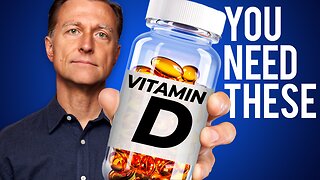Lesson From Spanish Flu Pandemic Of 1918 - Acute Respiratory Distress Syndrome (ARDS) – Dr.Berg
Recent research uncovered some important lessons from the 1918 Spanish flu pandemic.
Timestamps:
0:00 Important lessons from the 1918 Spanish flu pandemic
1:05 Researchers only recently discovered two factors that caused most deaths
2:57 I explain the significance of the month the Spanish flu pandemic began
In this video, I’ll share important lessons from the 1918 Spanish flu pandemic, in which 50 to 100 million people died worldwide. Isn’t it odd that so many people would die out of the blue? Here’s something interesting: they didn’t die of the virus itself. While the virus was involved, it’s not what killed them.
In autopsies done on exhumed bodies, researchers discovered most of the mortality was caused by two factors, acute respiratory distress syndrome (ARDS) and what’s called superinfection.
With ARDS, the lungs fill up with fluid, causing the person to drown in their own bodily fluid as well as their mucus to get stuck in their lungs. On top of this, there was a superinfection involving bacteria, not virus. The combination of these two caused the deaths.
A good portion of flu deaths involved people in their 20’s. Normally, the flu affects young children and elderly people. So what happened?
Well, four years earlier than the pandemic was World War I, resulting in a significant change in diet because food had to be transported great distances. Since the food had to be preserved, a lot of it was canned. And canning significantly decreases the zinc in food. Zinc is highly important to your immune system. This change affected both the military and people at home because of food rationing. Fewer fresh vegetables were available. People developed nutritional deficiencies, increasing their susceptibility to infection over the four years between the war and the pandemic.
The pandemic began in January, the month when vitamin D deficiencies are at their peak. When you have low vitamin D, your immune system doesn’t work too well. Your risk factor for lung problems goes way up. Vitamin D helps you access cortisol, which is an anti-inflammatory hormone.
I linked below to a chart describing which illnesses are associated with months of the year. In the winter, you have an increased risk of upper respiratory infections, relapses of multiple sclerosis (MS) and other autoimmune diseases, and Epstein Barr virus coming out of remission. Among other problems!
But why did so many young people die? Well, because they were treated with such high levels of aspirin that they were at high risk for pulmonary edema and increase the bacterial load. The combination of vitamin D and other nutritional deficiencies, and overdoses of aspirin were responsible for the deaths in the pandemic.
Dr. Eric Berg DC Bio:
Dr. Berg, age 56, is a chiropractor who specializes in Healthy Ketosis & Intermittent Fasting. He is the author of the best-selling book The Healthy Keto Plan and is the Director of Dr. Berg Nutritionals. He no longer practices but focuses on health education through social media.
Follow us on FACEBOOK: fb.me/DrEricBerg
Send a Message to his team: m.me/DrEricBerg
ABOUT DR. BERG: https://bit.ly/39LCWg8
Disclaimer: Dr. Eric Berg received his Doctor of Chiropractic degree from Palmer College of Chiropractic in 1988. His use of “doctor” or “Dr.” in relation to himself solely refers to that degree. Dr. Berg is a licensed chiropractor in Virginia, California, and Louisiana, but he no longer practices chiropractic in any state and does not see patients so he can focus on educating people as a full-time activity, yet he maintains an active license. This video is for general informational purposes only. It should not be used to self-diagnose and it is not a substitute for a medical exam, cure, treatment, diagnosis, and prescription or recommendation. It does not create a doctor-patient relationship between Dr. Berg and you. You should not make any change in your health regimen or diet before first consulting a physician and obtaining a medical exam, diagnosis, and recommendation. Always seek the advice of a physician or other qualified health provider with any questions you may have regarding a medical condition. The Health & Wellness, Dr. Berg Nutritionals, and Dr. Eric Berg, D.C. are not liable or responsible for any advice, course of treatment, diagnosis, or any other information, services, or product you obtain through this video or site.
Thanks for watching!
I explain important lessons learned from the Spanish flu pandemic of 1918.
-
 3:25
3:25
Dr. Eric Berg
13 days agoYou Need to Take More of This
8.15K29 -
 1:02:14
1:02:14
Geeks + Gamers
6 hours agoGina Carano DESTROYS Mark Ruffalo And Disney Double Standard, Japan Is FURIOUS Over Assassin's Creed
39.3K11 -
 1:13:29
1:13:29
Steve-O's Wild Ride! Podcast
2 days ago $0.13 earnedPenguinZ0 Has No Respect For Dr. Disrespect! - Wild Ride #222
35.5K6 -
 2:00:57
2:00:57
LFA TV
10 hours agoMERRY INDEPENDENCE! | LIVE FROM AMERICA 7.5.24 11am EST
55.6K39 -
 2:07:02
2:07:02
TENET Media
19 hours agoWhat Is A Conservative Woman? | The Culture War with Tim Pool w/Lilly Gaddis & Rachel Wilson
44.7K22 -
 46:55
46:55
Peter Santenello
6 hours agoWhat’s Happening at the Border? 🇺🇸🇲🇽
38.8K38 -
 1:38:55
1:38:55
Real Coffee With Scott Adams
6 hours agoEpisode 2527 CWSA 07/05/24
48.2K40 -
 2:58:25
2:58:25
Wendy Bell Radio
11 hours agoPublic Enemy #1
78.4K132 -
 41:23
41:23
The Why Files
5 days agoBaltic Sea Anomaly, Atlantis, and Underwater Alien Bases | Mysteries of the Ocean Pt 1
105K72 -
 11:29
11:29
TimcastIRL
1 day agoReporters TURN On Biden, Accuse Him Of Sleeping During White House Press Briefing
71.5K62